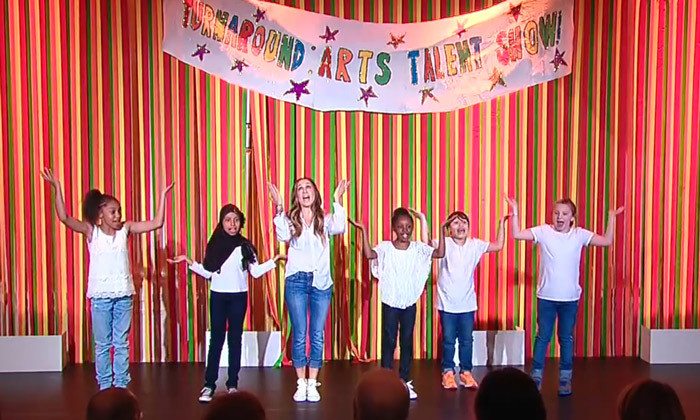From the White House to the Playhouse, One Portland Student's Journey

Sarah Jessica Parker with Sinai La’ryn Jones (third from right) and fellow King School students
The Piano Lesson
Portland Playhouse
Sept 24–Nov 2In reality, 9-year-old Portland-native Sinai La’ryn Jones is anything but shy. More like a poised and knowing adult, the young performer has had an invigorating year that has taken her from the White House to the Playhouse for her role as Maretha (she trades off the role with Seraiah Hardy and Bella Freeman-Moule), Berniece’s daughter.
Last Spring, the self-proclaimed singer, dancer, and actor—a triple threat indeed—joined her peers at NE Portland’s King School for a performing arts workshop—part of the school’s recently implemented arts education program. Then on the morning of May 2, administrators told her the workshops were in part a secret audition, and she had passed: she was going to perform at the first-ever White House Turnaround arts Talent Show—alongside Sarah Jessica Parker and four other King students.
“I was like, ‘Oh my God’—shocked,” Jones giggles after rehearsal. She wasn’t the only one surprised by the news. “Mom was literally freaking out,” she says, laughing even more.
With 85 percent of its students on reduced meal programs, King School was selected as one of eight schools nationwide to pilot a new program for Turnaround Arts, a public-private partnership seeking to use arts education to improve engagement and the learning culture high-poverty, underperforming schools. As part of the program, a nationally renowned artist was paired with each school to work with students. Beginning in fall of 2013, Sarah Jessica Parker visited and Skyped with King students.

From left to right, Seraiah Hardy, Bella Freeman-Moule, and Sinai La'ryn Jones trade off the role of Maretha in 'The Piano Lesson'
Image: Laura Domela
On May 20, Jones and the four other girls boarded a plane for DC. “I hadn’t been in an airplane since I was little, so it was like being in one for the first time,” she says. After spending a night in a hotel, the girls took their first steps into 1600 Pennsylvania Avenue. “It was really big,” Jones recalls, with emphasis on the really. And the first member of the Obama clan to greet them? None other than Bo and Sunny, the Obama’s Portuguese Water Dogs.
First Lady Michelle Obama welcomed the guests and kicked off the Talent Show. The King Students took the stage second to perform “You’re Never Fully Dressed Without a Smile” from the musical Annie, Parker leading their choreographer in cuffed jeans and a white t-shirt. (The 1979 Broadway production of the musical was Parker's first leading role.) You can watch the performance below; the girls skip on at the 23-minute mark.
The advice President Obama privately gave the Jones and her fellow students in a last minute surprise visit before the performance—to always be aware of the things you can do when you put your mind to it—radiates from Jones, who ends her performance with the splits before speaking effortlessly on behalf of her group.
“It was a lot of fun,” Jones says. “Turnaround Arts is a really good way for students to gain confidence and let out their creativity.” Of course, Jones is already in tune with the capacity of community-based art programs to transform lives, being a member of Maverick Main Stage Productions, a Portland-based nonprofit performing arts company.
Jones first heard about The Piano Lesson from a family friend who knew the Portland Playhouse was looking for a young girl to play Maretha. Jones contacted the Playhouse and they had her come in for an audition. According to Katie Watkins, marketing and communication manager for the Playhouse, “the rest is history!”
The Piano Lesson, the fourth play in Wilson’s legendary Century Cycle, which stages a play a decade in Pittsburgh, is laden with complex cultural nuances and highly symbolic characters. “My character Maretha and I have a lot in common, except I’m not as shy, and I try to be more open-minded,” says Jones, speaking about the play with the same reverence she uses to talk about her time at the White House. When asked if someone had to explain the play’s meaning, Jones shakes her head: “there are a lot of deep messages.”




